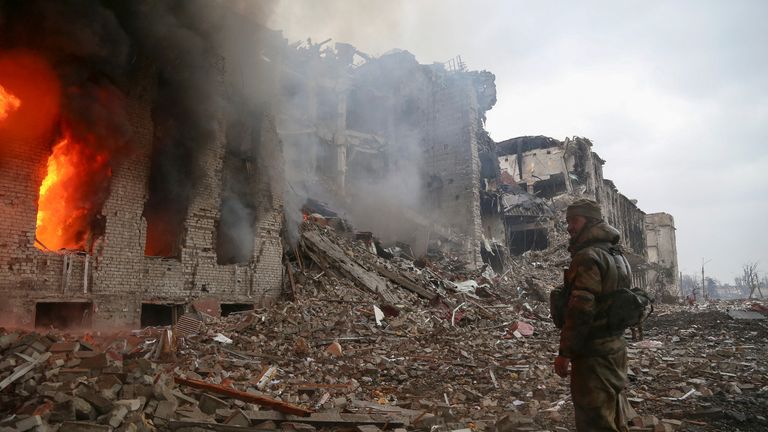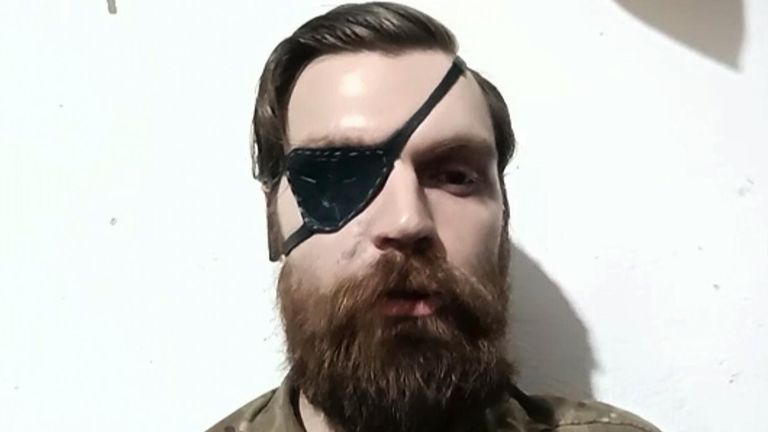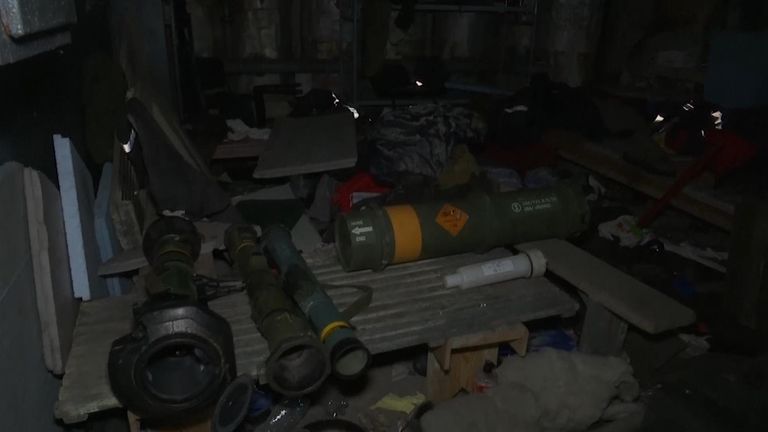Ukraine war: How wives of imprisoned Azovstal fighters are honouring them
Exactly two years on since they were forced to surrender to Russian forces, hundreds of the Azov fighters who captured the world's attention as they tried to defend Mariupol at the start of the war are still captive, their whereabouts unknown.
Thursday 16 May 2024 10:58, UK
On the day of their marriage, Mariia Alieksieievych's husband, Serhii, was holding out at the Azovstal steelworks in Mariupol, the last bastion of resistance in the besieged southern port city of Ukraine as it came under one of the harshest sieges since the Second World War.
Mariia, 26, was almost 1,000km away in Khmelnytsky, where the couple had been living together before Russia's full-scale invasion in February 2022.
The world looked on to see whether the Azovstal defenders would manage to hold back Russian forces as they ran out of food, water and ammunition.
Serhii, 29, fought on despite having a bullet stuck in a leg bone since mid-April, which couldn't be removed due to the lack of supplies.
Ukraine war latest: Ukrainian troops move into new positions
He made no mention of his agony when he spoke to Mariia. Instead, he asked her to marry him.
"On 27 April, 2022, when Serhii was at Azovstal, we got married.
"Serhii recorded a video for the registry office, in which he said he wanted to marry me, provided his and my personal data, I showed them the video, provided the necessary documents, and we got married," Mariia told Sky News.
"I remember that day quite often, because at least on that day I was able to cheer Serhii up, give him hope for the best, that he would get out of Mariupol alive and that everything would be fine with us."
Read more from 2022: Why the siege of Azovstal mattered
The 'terror' attack
Mariia's husband suffered a wound to his other leg in the Olenivka attack on 28-29 July 2022, which killed at least 50 Ukrainian prisoners and injured 100 more, according to the Russian Defence Ministry, the only source on the casualty figures.
Many of the prisoners at the targeted detention centre belonged to the nationalist Azov regiment as defenders of the steelworks were transferred there following their surrender on 16 May.
Speaking on the day marking two years since their husbands' surrender, the wives of some Mariupol soldiers who are still prisoners of war (PoW) and whose whereabouts are unknown have spoken to Sky News about the limbo they're in.
Kseniia Prokopenko's brother, Ihor, is yet to be buried after being killed in the Olenivka attack - for which Russia and Ukraine have traded blame - at the age of 21.
His body was returned in October 2022, but he had been burned so badly that Ihor couldn't be recognised.
While the family got a DNA match in May last year, they are still waiting for the results of an independent DNA test before saying their final goodbyes.
"Ihor was not married, he had no children," said Kseniia. "We still cannot believe that this has happened and we will never see our Ihor again."
'Not enough done'
She said she didn't even know her brother had been transferred to Olenivka when the lists of casualties were released. Ihor's name was second on the list of those killed.
Kseniia has been campaigning with relatives of PoWs for Ukrainian authorities and the international community to ramp up efforts to protect soldiers in captivity and prevent another Olenivka.
"I realise now that enough wasn't done two years ago when this terrorist attack happened, to raise this topic so the international community understands that Russia is a terrorist state and it kills and tortures prisoners of war, enough wasn't done from our authorities," she said.
As a member of the Olenivka community, she has travelled to Switzerland twice, to meet representatives of the International Committee of the Red Cross (ICRC) and the United Nations (UN) and speak at the Swiss parliament.
Ana Lobov's daughter was one-month-old when her husband, 32 and another Azovstal defender, left for the frontline.
Read more from Sky News:
Antony Blinken plays 'Rockin in the Free World' in Kyiv nightclub
Sky's Deborah Haynes reports from Ukrainian village under threat
She recalled how on 31 July, just a few days after the Olenivka attack, her husband's name, Oleh, appeared on both lists of those killed and those injured. "I didn't really know what to make of it," Ana, 29, now based in Zhytomyr, said.
The last time Ana spoke to her husband was on 16 May, the day of the surrender, when he sent her a personal text but didn't give any information or promise he would return.
'You could see how tired he felt'
But on 17 August that year, she spotted Oleh in a Telegram video from a hospital in Donetsk.
"That's how I found out he was alive," she said. "That was the only time since the start of the full-scale war that I saw him."
In the video, Oleh said he had shrapnel wounds all over his body and a wound to his hand, Ana said.
"You could see that he's lost weight and if you looked into his eyes, you could see how tired he felt."
Through a released prisoner who she spoke to in December that year, Ana was able to obtain some information about her husband, including that he had spent six months in hospital and had been put in isolation after catching a supposed cold.
Speaking of how her daughter would play with a family picture attached to a fridge magnet, Ana said she has now started avoiding talking about her father to her now-toddler girl, Mariia.
But she would probably still "recognise her daddy" if she found any pictures "in the wardrobe or somewhere where I keep them".
Ana says that ensuring her daughter grows up with her dad "encourages me to continue fighting for the release of my husband and his friends and those people who turned out to being in captivity".
She went on: "I believed that international organisations were going to visit the victims of the terrorist attack, get reliable lists, that the seriously wounded would be taken from hospitals to a third country, but this did not happen either in a month or almost a year later."
After the UN fact-finding mission, which had been set up to investigate Olenivka, was disbanded in January 2023, citing the "absence of conditions required for the deployment of the Mission to the site", Ana took matters into her own hands and created the Olenivka community group.
'There is still threat to their life'
The group gathers every Sunday to call for an investigation into what happened in Olenivka as members fear it may happen again.
The PoW's wives are now looking into how they may personally appeal to officials from countries such as Saudi Arabia and the United Arab Emirates (UAE) to get their other halves released through negotiations.
The UAE has been mediating in prisoner exchange negotiations, including when more than 200 prisoners on each side were freed in early January, in what Ukraine described as the largest documented swap of troops until then.
According to an Azov brigade commander quoted by local media in February, more than 900 Azov fighters are still in captivity.
"Our biggest fear is that history can repeat itself, that this kind of event can happen once again," Mariia said, while claiming that despite "constant" efforts to get information from state authorities or the ICRC about her husband, they were never able to help.
"It's been two years and we still don't know the Russians logic, why, what made them move these people to this separate barrack and why it happened, why they wanted to kill them," she said.
"There is still threat to their life and health."
Anastasiia Gondul, 47, hasn't had any news of her husband Artem, 41, since she saw him on Russian TV in the August after the Olenivka attack, in which he was reportedly injured.
She knows he had already been severely injured while at the Azovstal plant, with part of a mine believed to still be stuck in his pelvis.
She has now made it her priority to raise awareness of PoWs who, two years on, are still in foreign hands under practically unknown circumstances.
Anastasiia, who at one point started taking antidepressants to tackle the anxiety of her husband being on the frontline, has travelled to Geneva to address the UN and Red Cross, as well as Poland to speak at the Warsaw Human Dimension Conference, organised by the Organization for Security and Co-operation in Europe (OSCE).
She also travelled to Canada, where she visited her daughter and organised a peaceful protest in Montreal and Ottawa.
Anastasiia, Maria and Ana also met the papal ambassador to Ukraine, Archbishop Visvaldas Kulbokas, for support.
At the request of the Olenivka group, peaceful protests were held in Winterthur, Milan, London, Wales, Birmingham, Warsaw, Munich, Augsbur, Quebec, Sacramento, Paris, Prague, Madrid, La Coruña and Stockholm.
The women of the Olenivka group hold a peaceful protest every Sunday in cities across Ukraine to ensure the plight of PoWs remains in the public's conscience.
The Ukrainian and Russian governments have been approached for comment.
ICRC access to PoWs
An ICRC spokesperson told Sky News it has visited more than 3,000 PoWs on both sides, assessing their condition and treatment.
The ICRC has 26,900 open cases of missing people, both civilians and military. More than 8,700 families have received news from the organisation on their loved ones' fate or whereabouts.
During visits, "much-awaited news" from families are shared with detainees, while any concerns about their condition will be raised privately with authorities, a statement says.
But the ICRC still doesn't have "the full access to all PoWs", with many prisoners and civilian internees still waiting for a visit.
"We continue our efforts to access all of them. We also know that every day is full of uncertainty for their families who are looking for reassurance," the spokesperson said.
'Families have the right to know'
The ICRC pointed to how under the Geneva Conventions, it must be allowed to visit all PoWs as many times as needed, but added that it cannot enforce the rules.
"We understand the frustrations of those families who wait in anguish with no news at all. Families have the right to know about the fate of their loved ones, whether they are alive, wounded, or dead.
"Many have waited anxiously for too long - they need answers today. We will not rest until we are able to see all PoWs, not just once, but repeatedly wherever they are held."














